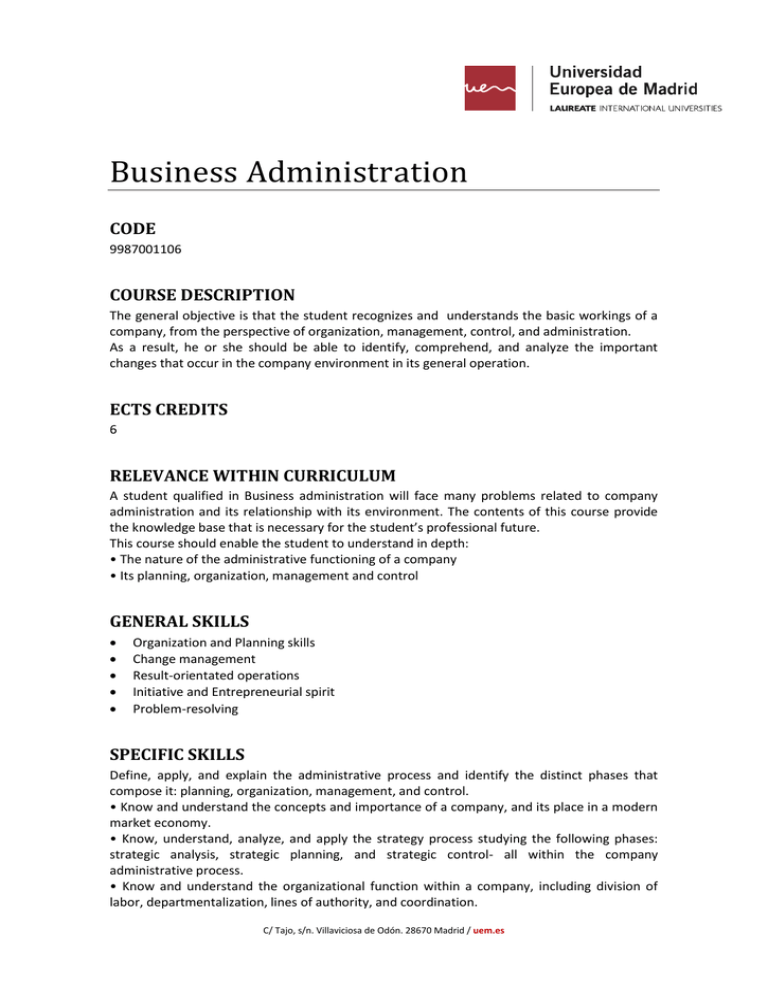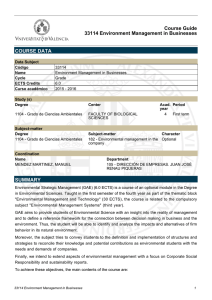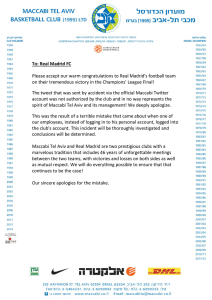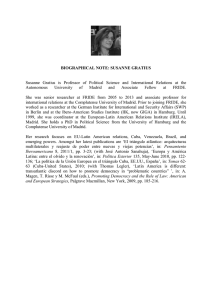Business Administration
Anuncio

Business Administration CODE 9987001106 COURSE DESCRIPTION The general objective is that the student recognizes and understands the basic workings of a company, from the perspective of organization, management, control, and administration. As a result, he or she should be able to identify, comprehend, and analyze the important changes that occur in the company environment in its general operation. ECTS CREDITS 6 RELEVANCE WITHIN CURRICULUM A student qualified in Business administration will face many problems related to company administration and its relationship with its environment. The contents of this course provide the knowledge base that is necessary for the student’s professional future. This course should enable the student to understand in depth: • The nature of the administrative functioning of a company • Its planning, organization, management and control GENERAL SKILLS Organization and Planning skills Change management Result-orientated operations Initiative and Entrepreneurial spirit Problem-resolving SPECIFIC SKILLS Define, apply, and explain the administrative process and identify the distinct phases that compose it: planning, organization, management, and control. • Know and understand the concepts and importance of a company, and its place in a modern market economy. • Know, understand, analyze, and apply the strategy process studying the following phases: strategic analysis, strategic planning, and strategic control- all within the company administrative process. • Know and understand the organizational function within a company, including division of labor, departmentalization, lines of authority, and coordination. C/ Tajo, s/n. Villaviciosa de Odón. 28670 Madrid / uem.es • Understand and apply new trends in business administration: people-leadership skills, knowledge management, emphasis on innovation, etc. that allow for better business success• Enabling the student to experience the role of leadership, through understanding and applying the different leadership theories to practical business cases. • Understanding the importance of motivation in the development of a company, by studying and practicing its use SUBJECT CONTENT Theme 1: Business Administration 1.1. Organizations and the need for administration. Effectiveness and Efficiency 1.2. Introduction to the administration process. 1.3. Management levels and qualities. 1.4. The administrative challenge 1.5. The company and its management as a system 1.6. Company administration in the twenty-first century 1.7. The development of administrative thought. A general vision Theme 2: Decision-making 2.1. The essence of a manager’s work. 2.2. Detecting problems and opportunities. 2.3. Types of problems and types of decisions. 2.4. The rational model for decision-making 2.5. Decision environment. 2.6. Problem resolution in an environment of uncertainty 2.7. Problem resolution in an environment of risk 2.8. Limited rationality and conformism. 2.9. Group decision-making. Creativity and innovation Theme 3: From strategic planning to strategic management 3.1. The planning function. 3.2. Strategic and tactical planning. 3.3. The planning elements 3.4. Evolution of the strategic concept and the rise of strategic management 3.5. The process of strategic management. 3.7. Evaluation and selection of strategy. 3.8. Implantation of strategic 3.9. Strategic control Theme 4: Organizational design and organizational structure 4.1. The division of labor. 4.2. Departmentalization. 4.3. Designing the structure or control network. 4.4. Coordination mechanisms. 4.5. Design and organization 4.6. Variables which determine the organizational structure. C/ Tajo, s/n. Villaviciosa de Odón. 28670 Madrid / uem.es 4.7. Level of formalization in the organization- mechanisms. 4.8. Organizational structures 4.9. New structural configurations 4.10. Evolution and change in the organizational structure Theme 5: The management function- Leadership and motivation 5.1. Introduction to the management function 5.2. Strategic and cultural dimension 5.3. Definition of leadership 5.4. Traditional explanative theories of leadership 5.5. Concepts and elements of motivation. 5.6. Basic ideas of motivation. 5.7. The theory of needs. 5.8. Motivation techniques: from theory to practice. 5.9. Contingency focus- Leadership and motivation. LEARNING ACTIVITIES Class lessons: lectures by the teacher on theoretical aspects necessary to understand the subject Case Method: Discussion of real cases: using real situations to apply in a practical way the knowledge and theory acquired. Each case also allows for follow-up analysis and discussion. Co-operative learning: students learn to cooperate with others (both classmates and teachers) to creatively solve problems that arise in the operation of a company. Activities can be formal or informal, ranging from games and puzzles to role-play simulations. Problem-based learning: focusing on introducing the student to the reality of business administration. Real problems are put to the student for them to solve in teams. ASSESSMENT The evaluation will be of a continuous nature, and will be carried out both at an individual and group level (depending on the nature of the activity being evaluated). The evaluation process for the ‘ordinary’ exams will have the following characteristics: • Written tests will not count for more than 50% of the final grade • The rest of the grade will be evaluated by a combination of some or all of the following activities: • Individual exercises • Group exercises • Presentations • Case studies • Class participation • Rebates • Reports • Involvement in Forums • Other activities by the student, with the student being aware of the weight and evaluation process beforehand, and these activities being in line with the learning objectives of the subject C/ Tajo, s/n. Villaviciosa de Odón. 28670 Madrid / uem.es In the ‘extraordinary’ exam, the student will only have to carry out the activities and written tests no passed during the course, with the result that they can still achieve the maximum grade. The exams will carry the same weight in both examination periods (ordinary and extraordinary), never being more than 50% of the total grade. Under no circumstances will the class attendance of the student form part of the final grading process. Detailed information regarding the evaluation process can be found on the space allocated to each subject in Moodle. SPECIFIC NORMS 1. Punctuality: students are expected to be on time and regular late-comers will not be allowed in the classroom after the lesson has started. 2. Respect for others: games, mobiles, emails/internet are prohibited during lessons. 3. Prepare: read all related material posted on the web before each lesson and bring all necessary equipment/photocopies/print-outs to class. 4. Participation: active participation during lessons is encouraged. If possible, all doubts must be raised during the corresponding lesson -we ALL learn from each other’s doubts!! 5. English: this is a bilingual course. Language doubts must be solved by you before lessons and exams. 6. Computer skills: knowledge of Word, Power Point, Excel is required. BIBLIOGRAPHY AGUIRRE, A., CASTILLO, A.; y TOUS, D. (2003): La Administración de Organizaciones en el Entorno Actual, Pirámide, Madrid. BUENO CAMPOS, E.; CRUZ ROCHE, I. y DURÁN, J. (2002): Economía de la Empresa. Análisis de las Decisiones Empresariales, Pirámide, Madrid BUENO CAMPOS, E. (2004): El Gobierno de la Empresa, En Busca de la Transparencia y la Confianza Pirámide, Madrid CABANELAS OMIL, J. (1998): Dirección de Empresas. Bases en un Entorno Abierto y Dinámico, Pirámide, Madrid. CASTILLO, A., ABAD, I y RASTROLLO, M. (2007): Casos Prácticos de Administración y Dirección de Empresas, Pirámide, Madrid. CUERVO, A: (1994): Introducción a la Administración de Empresas, Civitas, Madrid. DAFT, R., MARCIC, D. (2006): Introducción a la administración, Thomson, Madrid. DASI, M., DOLZ, C., FERRER, O. y IBORRA, J. (2006): Fundamentos de Dirección de Empresas. Conceptos y habilidades directivas. Thompson editores, Madrid. FERNANDEZ, E., JUNQUERA, B. y DEL BRIO, J. (2008): Iniciación a los negocios. Aspectos Directivos, Paraninfo, Madrid. GARCIA DEL JUNCO, J., CASANUEVA, C. y otros (1998): Casos Prácticos de Economía de la Empresa, Pirámide Madrid. GARCIA DEL JUNCO, J., CASANUEVA, C.(coords) (2002) :Fundamentos de Gestión Empresarial, Pirámide Madrid. C/ Tajo, s/n. Villaviciosa de Odón. 28670 Madrid / uem.es HELLRIEGEL, D., SLOCUM, J. y JACKSON, S. (2002): Administración, un enfoque basado en competencias. South-Western, Ohio. HERNÁNDEZ ORTIZ, M. (2000): Casos Prácticos de Administración y Organización de Empresas, Pirámide, Madrid. LUQUE de la TORRE, M, BUENO, Y. y SANTOS, B.(2001): Curso práctico de Economía de la Empresa, Pirámide, Madrid. MAYNAR, P. y otros (2008): La Economía de la Empresa en el espacio europeo de educación superior, McGraw-Hill, Madrid. PÉREZ GOROSTEGUI, E (2004): Economía de la Empresa (Introducción), CEURA, Madrid. PÉREZ GOROSTEGUI, E. (2004): Introducción a la Administración de Empresas, CEURA, Madrid.. PÉREZ GOROSTEGUI, E. (2004): Prácticas de Administración de Empresas, Pirámide, Madrid. ROBBINS, S.P., COULTER, M. (1996): Administración, Prentice-Hall Hispanoamericana. SUÁREZ SUÁREZ, A.S. (2004): Curso de Economía de la Empresa, Pirámide, Madrid. BATEMAN, T. S. y SCOTT S. A. (2010): Management, leading and collaborating in a competitive world, McGraw-Hill. CORNELISSEN, J. (2008): Corporate Communication, a guide to theory and practice, Sage, London. FERRELL, O. C., HIRT G. A., FERRELL, L. (2009): Business: a changing world, McGraw-Hill. HELLRIEGEL, D., JACKSON, S. E. & SLOCUM J.W. (2002): Management, a competency-based approach, South-Western, Ohio. KOOTNZ, H., WEILRICH, H. (2005): Management, a global perspective, McGraw-Hill. ROBBINS, S.P., COULTER, M. (2005): Management, Prentice Hall, New Jersey. STONER, J., FREEMAN, R.E. y GILBERT, D.R. (2007): Management, Pearson. C/ Tajo, s/n. Villaviciosa de Odón. 28670 Madrid / uem.es


